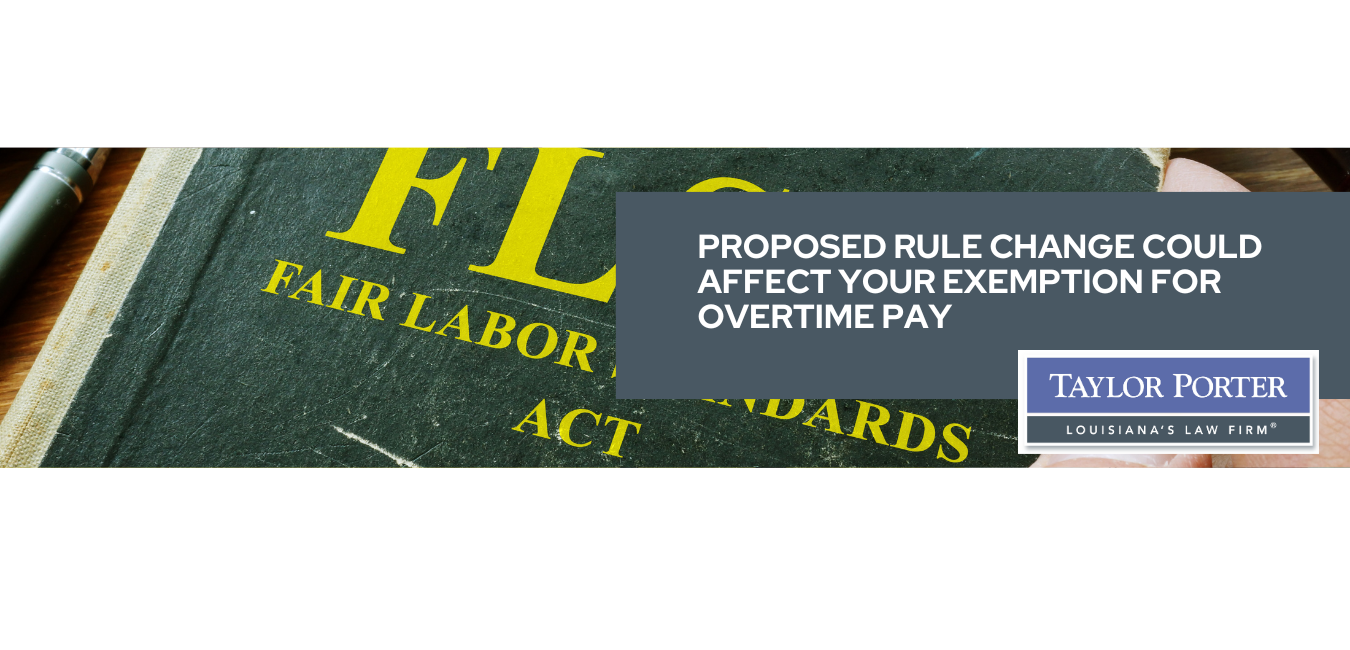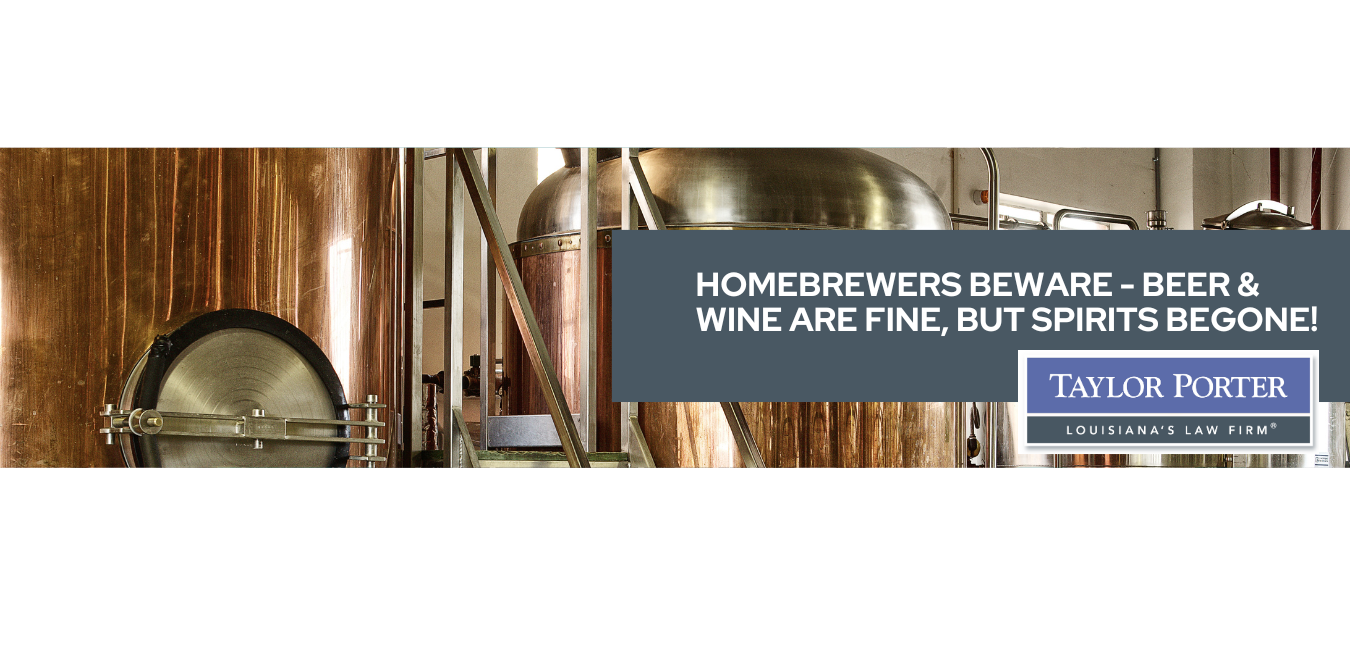No Contractor’s License? Contract is an Absolute Nullity: Recent Decisions
By: Kari “Kiki” A. Bergeron – Partner, Taylor Porter Construction Practice;
kari.bergeron@taylorporter.com

Under La. R.S. 37:2160(A)(1), it “shall be unlawful for any person to engage or to continue in this state in the business of contracting, or to act as a contractor as defined in this Chapter, unless he holds an active license as a contractor...” In Louisiana, the licensing provisions for contractors were enacted to protect the interests of public order. Under La. C.C. art. 2030, a contract in violation of a rule of public order is an absolute nullity, and an absolutely null contract is deemed to have never existed. It is well established in Louisiana law that a construction contract made with an unlicensed contractor is an absolute nullity. Several recent decisions by Louisiana courts have discussed the legal effects of such a finding.
1. Unlicensed Contractor Prohibited from Recovering under Theory of Unjust Enrichment due to the “Substandard Work Exception.”
In Quaternary Res. Investigations, LLC vs. Phillips, 2018-1543 (La. App. 1 Cir. 11/19/20), 316 So.3d 448, Quaternary Resource Investigations, LLC (QRI) entered into a home renovation contract with David and Angela Phillips to renovate and add on to their existing home. Prior to entering into a contract, QRI told the Phillipses that it was licensed to conduct this work; however, after QRI’s work began, Mr. Phillips learned that QRI did not possess the proper residential building contractor’s license. Thereafter, the Phillipses terminated the contract with QRI. QRI filed suit against the Phillipses seeking the contract balance. The Phillipses alleged that QRI made false and intentional misrepresentations about its license and alleged QRI’s work was defective, incomplete, and never reached substantial completion. In addition, the Phillipses alleged that the contract was an absolute nullity because QRI was not licensed. Thereafter, QRI amended its petition to add an alternative unjust enrichment claim, and after a bench trial and proceedings before a Special Master, the trial court rendered judgment in favor of QRI in the amount of $141,876.72. The Phillipses appealed.
The First Circuit Court of Appeal acknowledged it was undisputed that during the time QRI worked on the Phillipses’ house it did not possess the proper contractor’s license. Therefore, the court concluded that contract violated “La. R.S. 37:2160(A) and La. R.S. 37:2167(A), which are rules of public order requiring contractors to be properly licensed to contract and perform work. Any contract made in violation of the Contractors Licensing Law is null and void…Therefore, we agree with the finding of both the Special Master and the trial court that the June 1, 2010 contract is an absolute nullity and is void ab initio.” Quaternary at pp. 458-459.
The court reviewed whether QRI was entitled to recover under its unjust enrichment claim in light of the absolutely null contract. The Phillipses argued that QRI’s fraud, along with its defective, substandard, and incomplete work, prevented it from recovering under unjust enrichment. The court discussed the general rule that in the case of an absolutely null contract, courts generally limit the recovery of unlicensed contractors to the actual costs of their labor, materials, and services, with no allowance for overhead or profit. The court then discussed Hagberg v. John Bailey Contractor, 425 So.2d 580 (La. App. 3 Cir. 1993) and Dennis Talbot Const. Co. v. Private Gen. Contractors, Inc. 10-1300 (La. App. 3 Cir. 3/23/11), 60 So.3d 102 in detail, which provide exceptions to that general rule of recovery under unjust enrichment. In these cases, if an unlicensed contractor’s actions fall into the “substandard work exception” or the “fraudulently obtained contract exception,” it is not entitled to recover its actual cost of labor, materials, and services under unjust enrichment. Quaternary at pp. 463-467.
The court found that the Phillipses specifically pled incompetence, inexperience, and fraud on the part of QRI, which fell under the “substandard work exception” discussed in Hagberg and Dennis Talbot. Accordingly, the court held the trial court erred in granting QRI’s demand and awarding QRI damages under unjust enrichment because QRI’s actions fell within the “substandard work exception.” Hence, QRI was prohibited from recovering its actual costs of its labor, materials, and services under unjust enrichment.
2. The Louisiana Supreme Court applies the “Clean Hands” Doctrine to an Unlicensed Contractor attempting to avoid Contractual Indemnity to Owner under Absolutely Null Contract.
In Ioannis Maroulis v. Entergy Louisiana, LLC, et al., 20-226 (La. App. 5 Cir. 2/10/21), 314 So.3d 1002, the issue of contractual indemnity under an absolutely null contract was addressed. The case involved a work-related accident that occurred during the renovation of a Metairie hotel. Hotel Investors, LLC (Hotel Investors), as owner, hired Sigur Construction, LLC (Sigur) and Castleman, Donlea, and Associates, LLC (Castleman) as the general contractors for the project. Castleman hired Sunbelt Rentals Scaffold Services, LLC (Sunbelt) as the scaffolding subcontractor for the project. Mr. Maroulis, an employee of Sunbelt, was injured during the project, and he filed suit against Hotel Investors, among others, alleging negligence. Hotel Investors filed a third-party demand against Castleman and its insurer, Evanston Insurance Company (Evanston), alleging breach of the construction contract between Hotel Investors and Castleman and sought insurance coverage under the Evanston policy.
Castleman raised the affirmative defense of an illegal contract, alleging the contract it entered into with Hotel Investors was absolutely null and void ab initio because Castleman was not a licensed contractor in Louisiana, and at that time, the licensing law required construction projects costing $50,000 or more to be performed by a Louisiana licensed contractor. Castleman filed a motion for summary judgment on this issue, which the trial court denied. Castleman filed a writ application seeking supervisory review of the judgment.
The Fifth Circuit Court of Appeal acknowledged that it was undisputed that Castleman was not a licensed contractor in Louisiana and that the cost of the project exceeded $50,000. The only issue before the court was whether the construction contract between Castleman and Hotel Investors was null and void, and, if so, what legal effects result from such a finding.
The court considered several arguments asserted by Hotel Investors that the contract was not null or that Castleman still owed contractual indemnity to Hotel Investors. First, Hotel Investors argued that all the work performed on the project was lawfully performed under Sigur’s valid contractor’s license, and Sigur and Castleman were both general contractors for the project and were in a joint venture. However, the court held this argument lacked merit because the law is clear that both parties to a joint venture must hold a proper contractor’s license.
Next, Hotel Investors argued public policy considerations should prevent the court from declaring the contract a nullity because it would allow Castleman to escape liability for worker injury. The court held this argument was flawed because (1) an injured party could bring his own claim against Castleman for such a failure and (2) Hotel Investors disregarded public policy when it elected to hire an out-of-state, unlicensed contractor.
Hotel Investors also asserted a “clean hands” argument, in which it argued that Castleman knew at the time of contracting that it was not licensed, which made the contract absolutely null, and Castleman may not avail itself of the nullity when the purpose of the illegal contract has been accomplished. The Fifth Circuit Court of Appeal found that Hotel Investors’ reliance on the “clean hands” doctrine was misplaced, as this was not a situation where an unlicensed contractor entered into a contract, performed the work, and the owner refused to pay the contractor for that work because the contract was null and void. The court noted that the “recovery cannot be achieved under the theory of breach of contract, because a contract made in violation of prohibitory law is illegal and its enforcement is precluded, even though work has been done or materials furnished.” Id., at p. 9. The court further noted that the performance sought by Hotel Investors was contractual indemnity for claims brought by Mr. Maroulis against Hotel Investors, and that performance had not been rendered. The court concluded that there was no support in Louisiana jurisprudence for the court to enforce an illegal contract, citing to W. Baton Rouge Par. Sch. Bd. V. T.R. Ray, Inc., 367 So.2d 332, 335 (La. 1979) (where the Louisiana Supreme Court found that the effect of having an AIA construction contract declared null and void ab initio was to have the execution of its arbitration clause enjoined). Under this reasoning, Hotel Investors’ attempt to enforce the terms of a null and void contract it signed with Castleman, including the contractual terms requiring indemnity against claims brought by injured workers, failed. Thus, Castleman, the unlicensed contractor, was not required to provide contractual indemnity to Hotel Investors, the owner of the project, because the contract was an absolute nullity.
Thereafter, the Louisiana Supreme Court granted Castleman’s writ of certiorari in Ioannis Maroulis v. Entergy Louisiana, LLC, et al., 2021-00384 (La. 6/08/21), 317 So.3d 316, and found La. C.C. art. 2033 applicable, which provides, in part, that an “absolutely null contract, or a relatively null contract that has been declared null by the court, is deemed never to have existed…Nevertheless, a performance rendered under a contract that is absolutely null because its object or its cause is illicit or immoral may not be recovered by a party who knew or should have known of the defect that makes the contract null.” The Louisiana Supreme Court further noted that the 1984 Revision Comment (c) to La. C.C. art. 2033 states, in part, that a “party who knew or should have known at the time of contracting of a defect that made the contract absolutely null may not avail himself of the nullity when the purpose of the illegal contract has been accomplished...This conclusion flows naturally from the principle expressed in the traditional Roman maxim, nemo propriam turpitudinem allegare potest (no one may invoke his own turpitude), sometimes called the ‘clean hands’ doctrine…” For those reasons, the Louisiana Supreme Court concluded that the district court did not err in denying Castleman’s motion for summary judgment; therefore, the court reversed the appellate court and reinstated the district court’s judgment.
3. Unlicensed Contractor Cannot Assert a Valid Lien under Louisiana’s Private Works Act.
In Ilgen Construction, LLC v. Raw Materials, LLC, et al., 2020-0862 (La. App. 1 Cir. 4/16/21), 2021 WL 1438726 (unpublished), Ilgen Construction, LLC (Ilgen), as owner of two tracts of immovable property, hired Raw Materials, LLC (RML), as contractor, to perform clearing and dirt work preparatory to the development of residential lots. Ilgen ultimately terminated RML’s services because it was dissatisfied with the quality and the timeliness of RML’s work. Thereafter, RML filed two separate Private Works Act (PWA) liens over both immovable property tracts, each in the amount of $50,500.00, along with a notice of lis pendens relating to a separate lawsuit that RML filed against Ilgen. Ilgen sent RML’s counsel demand letters requesting RML cancel the improperly filed liens, but RML did not comply with these requests. Thereafter, Ilgen filed suit against RML, an unlicensed contractor, and the Clerk of Court for a writ of mandamus and damages, requesting the cancellation of RML’s two PWA liens and the notice of lis pendens. After a hearing, the trial court ruled in favor of Ilgen, ordering the cancellation of the liens and lis pendens, and awarding attorney’s fees and damages to Ilgen. RML appealed.
The trial court concluded that RML’s failure to file a notice of contract in the mortgage records was “fatal” to RML’s lien rights under the PWA. The court also concluded that the liens were extinguished under La. R.S. 9:4823(A)(2) because RML failed to file a lawsuit to enforce the liens within one year of their filing. On appeal, RML argued it was a subcontractor, not a contractor, under the PWA that was hired merely to perform “dirt work”; therefore, RML was not required to file a notice of contract and its liens were valid. The First Circuit Court of Appeal held it was not necessary to determine if RML was a general contractor or a subcontractor under the PWA or whether the liens were extinguished due to a failure to timely file a lawsuit to enforce the liens. Even if the trial court erred in making those determinations, the First Circuit concluded RML’s liens were nevertheless fatally defective because RML was not a licensed contractor in Louisiana.
The court noted it was undisputed that RML did not possess a Louisiana contractor license; therefore, the contract between RML and Ilgen was an absolute nullity under long established Louisiana law and jurisprudence. The court noted that given the special nature of the rights provided by the PWA, its provisions must be strictly construed. The court, citing to Leija v. Gathright, 51,049 (La. App. 2d Cir. 12/21/16), 211 So.3d 592, 596, writ denied, 17-0144 (La. 3/13/17), 216 So.3d 806, noted that the PWA grants a lien to contractors and subcontractors to secure debts or principal obligations arising from contracts. The court concluded that in the absence of a valid and enforceable contract, a contractor or subcontractor cannot assert a valid lien under the PWA. Thus, the First Circuit Court of Appeal affirmed the trial court’s judgment canceling the two PWA liens and lis pendens, as well as the award of damages and attorney’s fees against RML and in favor of Ilgen.
Article addresses legal developments through July 19, 2021.
About Kari “Kiki” A. Bergeron: Taylor Porter Partner Kari “Kiki” A. Bergeron practices primarily in the areas of construction law, commercial litigation, and insurance coverage and insurance litigation. In her construction practice, Kikiepresents suppliers, subcontractors, design professionals, general contractors and owners in a wide array of litigation matters including breach of contract claims, delay claims, construction defect claims, and claims for additional compensation. She also regularly advises clients on compliance with Louisiana’s contractor licensing laws and Louisiana’s construction lien laws. Kiki also has extensive experience reviewing, revising and drafting construction contracts.
This website is for general information purposes only. Information posted is not intended to be legal advice. For more information, please see our Disclaimer message.
See how we can help. Contact us today
8th Floor • 450 Laurel Street • Baton Rouge, LA 70801 • 225-387-3221
- Disclaimer
- © Taylor, Porter, Brooks & Phillips L.L.P. All rights reserved.






